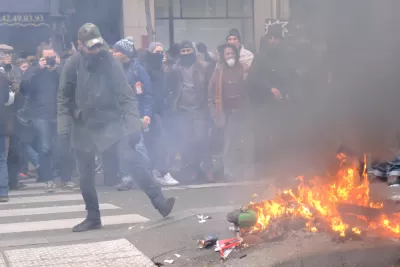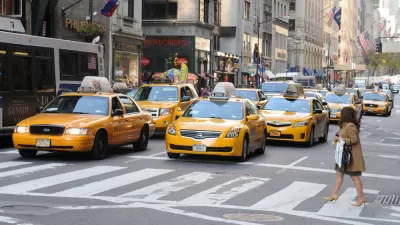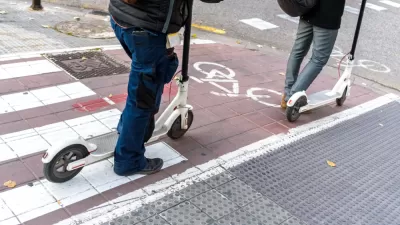Mobility-as-a-service companies have disappeared when essential workers needed them most, falling short of their promoted role as gap fillers.

According to Susie Cagle, public transit systems weren't the only mobility services leaving people stranded during protests and curfews in the past few weeks.
As cities across the country institute a variety of fast-changing curfews in response to protests, they are also cutting back or completely shutting down the public transit countless individuals use each night to make their way home and to work. Even private transportation services like ride shares, which have long advertised themselves as transit solutions by shoring up urban transit and making cities safer and more convenient, are temporarily shuttering.
Private transit companies are complying with shutdown orders in cities, according to Cagle, or even voluntarily suspending service, leaving essential workers without options for getting home and exposing them to the risk of being harassed or even arrested on the way home.
"These are all services that were pitched as making urban transportation more robust, cities more accessible, and residents safer," writes Cagle. "Once hailed as alternatives to the financial burden of private vehicle ownership without giving up safe and consistent mobility, the curfew has revealed that these transportation solutions are only as capable as the municipalities they operate in."
FULL STORY: Uber, Lyft, and Revel Curfew Closures Leave Commuters Stranded

Alabama: Trump Terminates Settlements for Black Communities Harmed By Raw Sewage
Trump deemed the landmark civil rights agreement “illegal DEI and environmental justice policy.”

Planetizen Federal Action Tracker
A weekly monitor of how Trump’s orders and actions are impacting planners and planning in America.

Why Should We Subsidize Public Transportation?
Many public transit agencies face financial stress due to rising costs, declining fare revenue, and declining subsidies. Transit advocates must provide a strong business case for increasing public transit funding.

‘Clybourne Park’ Sets Stage for Housing Equity Discussions
Clybourne Park, a play exploring race, real estate, and community tensions, can set the stage for discussion on the lasting impacts of housing discrimination, gentrification, and the fight for affordability.

Understanding Road Diets
An explainer from Momentum highlights the advantages of reducing vehicle lanes in favor of more bike, transit, and pedestrian infrastructure.

New California Law Regulates Warehouse Pollution
A new law tightens building and emissions regulations for large distribution warehouses to mitigate air pollution and traffic in surrounding communities.
Urban Design for Planners 1: Software Tools
This six-course series explores essential urban design concepts using open source software and equips planners with the tools they need to participate fully in the urban design process.
Planning for Universal Design
Learn the tools for implementing Universal Design in planning regulations.
Caltrans
Smith Gee Studio
Institute for Housing and Urban Development Studies (IHS)
City of Grandview
Harvard GSD Executive Education
Toledo-Lucas County Plan Commissions
Salt Lake City
NYU Wagner Graduate School of Public Service





























